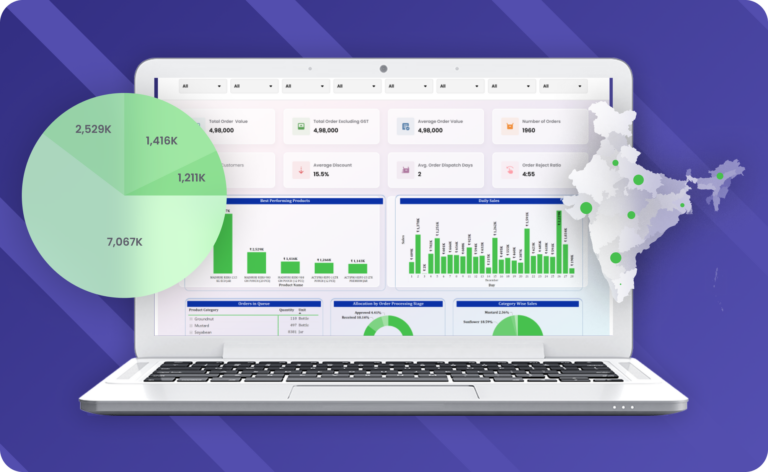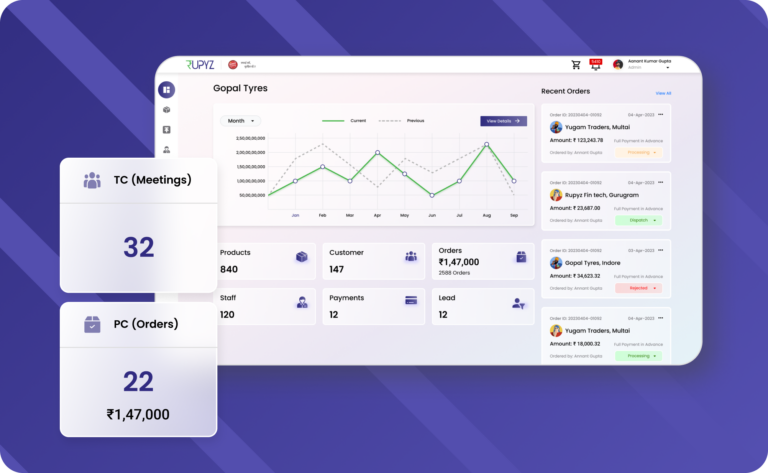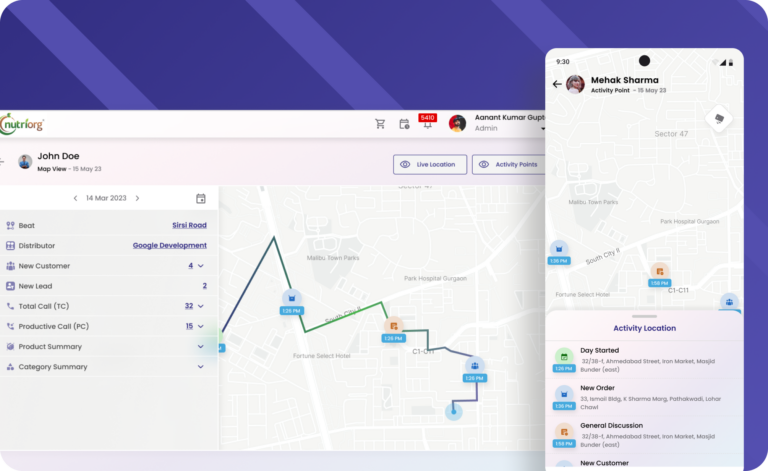
The Power of SFA: Leveraging Sales Force Automation to Stay Ahead of the CompetitionShape
In today’s dynamic business environment, maintaining a competitive edge requires more than traditional sales strategies. Companies need to be agile, efficient, and deeply focused on customer satisfaction. Sales Force Automation (SFA) has become a vital tool, transforming how organizations manage and optimize their sales processes, ultimately driving growth and fostering stronger customer relationships.
What is Sales Force Automation?
Sales Force Automation refers to the strategic use of technology to automate and optimize various tasks within the sales process. From lead generation and customer management to order processing and performance analysis, SFA tools are designed to enhance efficiency, improve customer interactions, and increase revenue by streamlining routine sales activities and providing actionable insights in real-time.
Key Advantages of Sales Force Automation
Implementing SFA offers numerous benefits, revolutionizing how organizations approach sales and customer relationship management. Let’s explore the core advantages of adopting an SFA system:
1. Boosted Operational Efficiency
One of the most significant advantages of SFA is the substantial boost in operational efficiency. By automating routine tasks like data entry, lead tracking, and follow-ups, sales teams can focus on more strategic activities such as building relationships and closing deals. This automation reduces manual errors and accelerates the sales cycle.
2. Strengthened Customer Relationships
SFA systems centralize customer information, making it easier for sales teams to access comprehensive customer profiles and interaction history. This enables more personalized and informed engagements, which strengthens customer relationships, builds trust, and enhances loyalty. With a full view of the customer journey, sales teams can anticipate needs and deliver exceptional service.
3. Enhanced Sales Forecasting Accuracy
Accurate sales forecasting is crucial for effective business planning and resource management. SFA tools utilize historical data and real-time insights to generate precise sales forecasts. This empowers businesses to make data-driven decisions, adjust strategies proactively, and allocate resources efficiently, leading to better business outcomes.
4. Seamless Communication Across Teams
Effective communication is vital for successful sales operations. SFA tools facilitate seamless communication within sales teams and across departments, ensuring everyone is aligned and working towards common goals. This is especially important in today’s remote work environment, where virtual collaboration is becoming increasingly prevalent. With SFA, teams can stay connected, share updates, and collaborate effectively, regardless of location.
5. Scalability for Growing Businesses
As businesses expand, their sales processes naturally become more complex. SFA systems are designed to scale alongside the organization, accommodating increased data volumes, user counts, and transaction complexities. This scalability ensures that the benefits of SFA continue to be realized as the business evolves, supporting long-term growth and success.
Steps for Successful SFA Implementation
While the benefits of SFA are clear, achieving successful implementation requires careful planning, strategic thinking, and effective change management. Here are essential steps to ensure a smooth and effective SFA rollout:
1. Establish Clear Goals
Before implementing SFA, it’s crucial to establish clear objectives that align with your broader business strategy. Whether the goal is to boost sales efficiency, improve customer relationships, or enhance data analytics, having a well-defined roadmap is key to guiding the implementation process and measuring success.
2. Conduct a Thorough Needs Assessment
Understanding your organization’s unique requirements and challenges is vital for selecting the right SFA system. Conducting a comprehensive needs assessment involves evaluating current sales processes, identifying pain points, and determining specific functionalities that will address these challenges. This ensures that the selected SFA tool is a perfect fit for your business.
3. Select the Right SFA Solution
Not all SFA systems are created equal. It’s important to choose a solution that aligns with your organization’s size, industry, and specific needs. Consider factors such as scalability, user-friendliness, integration capabilities, and vendor support. The right system will be one that grows with your business and adapts to its changing requirements.
4. Provide Comprehensive Training
User adoption is critical to the success of SFA implementation. Ensure that your team receives thorough training on the new system, covering both basic functionalities and advanced features. This investment in training will pay off in increased user proficiency, greater efficiency, and overall system effectiveness.
5. Cultivate a Culture of Adaptability
Introducing SFA often represents a significant change in how sales teams operate. Cultivating a culture of adaptability and providing continuous support throughout the transition is essential. Communicate the benefits of SFA clearly and emphasize how it aligns with the team’s success. Encouraging a positive attitude toward change can make the transition smoother and more successful.
The Future of Sales Force Automation
As technology continues to evolve, the future of SFA holds exciting possibilities for businesses. Here are some trends and developments that are shaping the future of SFA:
1. AI Integration for Smarter Sales Strategies
The integration of AI within SFA systems is becoming increasingly prevalent. AI algorithms can analyze vast amounts of data, predict customer behaviour, and automate decision-making processes, further enhancing the efficiency and effectiveness of sales teams. This integration allows businesses to leverage advanced analytics for smarter sales strategies and more accurate forecasting.
2. Predictive Analytics for Enhanced Decision-Making
Predictive analytics within SFA systems is evolving to provide more accurate forecasting and actionable insights. By leveraging machine learning algorithms, SFA systems can analyze historical data, identify patterns, and predict future sales trends with greater precision. This capability enables businesses to anticipate market changes and adjust their strategies accordingly.
3. Mobile-First SFA Solutions
With the growing reliance on mobile devices, SFA systems are placing a greater emphasis on enhancing mobile capabilities. Mobile applications are becoming more feature-rich, allowing sales teams to perform a wide range of tasks—from updating records to conducting virtual meetings—directly from their mobile devices. This mobility ensures that sales teams are always connected and productive, no matter where they are.
4. Voice-Activated SFA and Virtual Assistants
The integration of voice technology, including virtual assistants and voice-activated commands, is gaining traction in SFA. This technology streamlines tasks such as data entry and information retrieval, allowing sales professionals to interact with the system using natural language commands. Voice technology enhances efficiency by enabling hands-free operation and faster access to critical information.
Why Choose Rupyz Sales Force Automation for Your Business?
In a competitive business landscape, having the right tools can make all the difference. Rupyz Sales Force Automation (SFA) offers a comprehensive solution designed to help businesses stay ahead of the competition. With a range of powerful features, Rupyz SFA streamlines sales processes, enhances customer relationships, and drives business growth.
Advanced Features of Rupyz SFA:
- Smart Lead Management: Rupyz SFA offers intelligent lead management tools that automate lead tracking, scoring, and nurturing, ensuring that no opportunity is missed.
- Customizable Dashboards and Reports: Gain real-time insights into sales performance with customizable dashboards and detailed reports that help you make informed decisions.
- Seamless Integration: Rupyz SFA integrates effortlessly with your existing CRM, ERP, and marketing automation systems, providing a unified view of your sales operations.
- Mobile-Friendly Interface: With Rupyz SFA’s mobile-friendly interface, your sales team can access critical data, update records, and collaborate with colleagues from anywhere, at any time.
- AI-Powered Insights: Leverage AI to analyze sales data, predict trends, and recommend the next best actions, helping your team stay proactive and focused on closing deals.
- Enhanced Communication Tools: Facilitate seamless communication within your sales team and with clients, ensuring that everyone is aligned and informed.
- Automated Task Scheduling: Rupyz SFA includes tools for automating task scheduling and follow-ups, ensuring that nothing falls through the cracks and that your team stays on top of their activities.
- Real-Time Geo-Tracking: Track your sales team’s location and performance in real-time, allowing for better resource allocation and more efficient territory management.
- Gamification for Motivation: Introduce a competitive element to your sales strategy with gamification features that track performance and reward top achievers, keeping your team motivated and engaged.
Why Rupyz SFA Stands Out:
- Scalability: Rupyz SFA grows with business, adapting to your changing needs and supporting your expansion efforts.
- Ease of Use: Designed with the user in mind, Rupyz SFA is intuitive and easy to navigate, reducing the learning curve and encouraging adoption
Transform your B2B Business
We would love to give a comprehensive walk through of our system & demonstrate how we can contribute to your growth story.
Book A Demo




